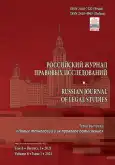Regulating Liability for Crimes Against Monetary Systems in the Context of Digitalized Economic Relations
- Authors: Pechegin D.A.1
-
Affiliations:
- The Institute of Legislation and Comparative Law under the Government of the Russian Federation
- Issue: Vol 8, No 1 (2021)
- Pages: 45-52
- Section: Trending topic
- URL: https://journal-vniispk.ru/2410-7522/article/view/64398
- DOI: https://doi.org/10.17816/RJLS64398
- ID: 64398
Cite item
Abstract
A monetary system is a historically established model of organized monetary circulation that includes the national monetary unit (legal tender), the types of banknotes, and the order of their issue and circulation. This model is normatively fixed, since it is a core component of the national economy. At the same time, the security of a monetary system is a primary strategic goal in the economy of a nation. The achievement of such a goal is possible by solving specific tasks related, inter alia, to the prevention of criminal actions in the analyzed area.
As key elements of crimes against the monetary system, national criminal legislation should highlight property obtained by criminal means, including laundering of funds (Articles 174 and 1741 of the Criminal Code of the Russian Federation), counterfeiting (Article 186), and the illegal turnover of payment funds (Article 187). Given the dynamics of changes taking place in society and the state, the structures of criminal elements are likewise subject to transformation, especially with regard to the development of digital financial technologies.
The legal vacuum of the new sphere of public relations, its subordination to algorithms and programs on the one hand, and the blank nature of these norms of criminal law, on the other, as well as the imperfections of procedural mechanisms focused on regulating “analog” public relations, as opposed to digital, on the other, form barriers to legal influence. This article is devoted to the analysis of these and other problems of the legislative regulation of crimes that encroach upon the monetary system via digital economic relations.
Full Text
##article.viewOnOriginalSite##About the authors
Denis A. Pechegin
The Institute of Legislation and Comparative Law under the Government of the Russian Federation
Author for correspondence.
Email: crim5@izak.ru
ORCID iD: 0000-0001-6499-9966
SPIN-code: 1020-5326
Scopus Author ID: 57204679118
ResearcherId: C-1067-2017
PhD, senior researcher
Russian Federation, MoscowReferences
- Filatova MA. Criminal liability for the legalization (laundering) of money or other property obtained by criminal means, according to the legislation of Russia and Austria: dis. ... cand. yurid. Moscow, 2014. 208 p. (In Russ.)
- Kondrat EN. Offenses in the financial sphere of Russia. Threats to financial security and Ways to counteract them. Moscow, 2014. 927 p. (In Russ.)
- Elizarova VV. Influence of shadow processes in the banking sector on the economic security of the country's financial system: diss. ... candidate of economic sciences: 08.00.10, 08.00.05. Moscow, 2010. 162 p. (In Russ.)
- Khabrieva TYa, Chernogor NN. Pravo v usloviyakh cifrovoi realnosti. Zhurnal rossiyskogo prava. 2018;(1):85–102. (In Russ.)
- Povetkina NA, Ledneva YV. Fintekh and Redtekh: Boundaries of Legal Regulation. Pravo. Journal of Higher School of Economics. 2018;(2):46–67. (In Russ.)
- Stepanov O, Pechegin D. Legal View On The Introduction Of New Technologies. Russian Law Journal. 2018;6(3):149–171.
- Kudratov M, Pechegin DA. Transfer of assets and illegal withdrawal of capital: actual problems of counteraction. Journal of Russian Law. 2020;(1):101–111. (In Russ.)
- Kucherov II. Elements of the Financial Security and its Legal Support. Journal of Russian Law. 2017;(6):69–79. (In Russ.)
- Egorova MA, Efimova LG. The concept of cryptocurrencies in the context of improving Russian legislation. Lex russica. 2019;(7): 130–140. (In Russ.)
- Lunts LA. Money and monetary obligations. Moscow, 1998. 131 p. (In Russ.)
- Krylov OM. Monetary surrogate as a legal category. Administrative and municipal law. 2019;(6):41–49. (In Russ.)
- Kuchina YaO. Cryptocurrency turnover as an object of crime and doctrinal errors of its perception. Actual problems of Russian law. 2020;(4):118–127. (In Russ.)
- Financial law: a textbook for bachelors / BG Badmaev, AR Batyaeva, KS Belsky, etc.; edited by IA Tsindeliani. 3rd ed., Moscow: Prospekt, 2016. 656 p. (In Russ.)
- Yani PS. Fake security as a subject of counterfeiting. Zakonnost’. 2016;(8):25–29. (In Russ.)
- Volzhenkin BV. Economic crimes. St. Petersburg, 1999. 312 p. (In Russ.)
- Yasinov OYu. Criminal liability for the manufacture or sale of counterfeit money or securities: counterfeiting: autoref. dis. ... cand. yurid. Moscow, 2006. 21 p. (In Russ.)
- Gaukhman LD. Criminal responsibility for crimes in the sphere of economy / LD Gaukhman, SV Maksimov. Moscow, 1996. 290 p. (In Russ.)
- Petryanin AV. Responsibility for the manufacture or sale of counterfeit money or securities: diss. ... cand. yurid. nauk. Novgorod, 2003. 221 p. (In Russ.)
- Kalatozi DG. Legal responsibility in the sphere of monetary circulation. Financial Law. 2020;(11):38–40. (In Russ.)
- Kashepov VP. Transformation of the institutions of the General part of criminal law through additional legislation. Journal of Russian law. 2013;(4):5–15. (In Russ.)
Supplementary files







